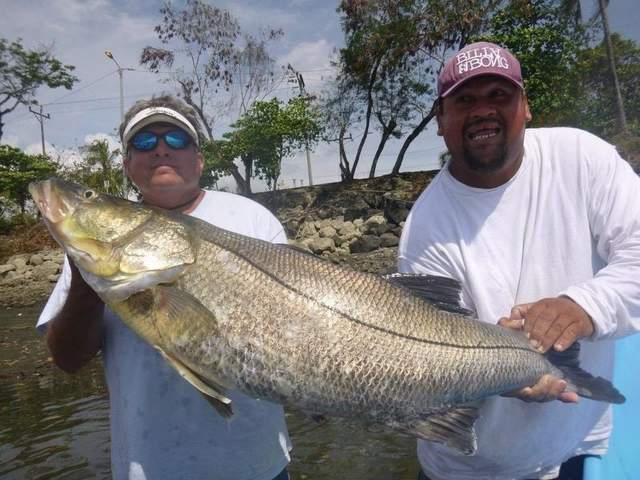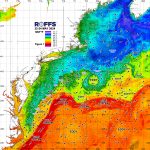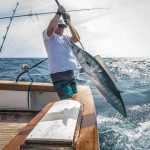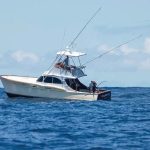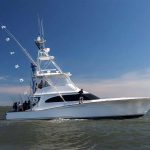Orlando snook fishing guide Ward Michaels may be headed for the world record book with a 60-pound Pacific snook he caught in Costa Rica two weeks ago.
Michaels, who has made more than 80 trips in 27 years to both coasts of Costa Rica for snook, called three friends from Texas when he knew the time was right for huge spawning females along the central Pacific coast.
“I told them to come on. The time is now,” said Michaels, who owns Michaels Hunting and Fishing, Inc., a sportsman’s booking and guiding agency in Orlando.
In three days, they caught more than a dozen heavyweights, most in the 30-pound range and other giants of 47 and 50 pounds. All were pre-spawn females.
Michaels is submitting the 60-pound catch to the International Game Fish Association (IGFA), the world records keeper at Dania Beach, and if it is accepted it would break the existing Pacific black snook all-tackle record of 57 pounds, 12 ounces set in 1991 at Rio Naranjo near Quepos, Costa Rica. All-tackle marks are the heaviest-of-species catches on record.
The Pacific black snook is one of six subspecies found in the Pacific and is the largest. Another six subspecies exist only in Atlantic waters, including the Caribbean and Gulf of Mexico, the largest being the common snook, also known as the Atlantic snook and the principal snook in Florida. It is regulated in Florida by seasons and bag and size limits.
The IGFA all-tackle common (Atlantic) snook record weighed 53 pounds, 10 ounces and came from Parismina Ranch on the Caribbean coast.
Michaels said he has learned much from resident commercial fishermen about Costa Rica’s snook, including their spawning rituals around river mouths, like the one south of Quepos where they fished.
“The new moons in March and April are when the big females stage off the beaches before they move into the rivers to spawn,” Michaels explained. “Each time, everything happens in three days.”
Michaels, along with Curtis Bedrich, Jack Mourning and Rod Scarborough, all of Houston, joined two native commercial fishermen for the three days during the March 1 new moon and they fished from the fishermen’s boats. They were known only as Big John and Jeffrey.
“The last day we caught four over 40 pounds,” said Michaels, 52, also a guide out of South Florida’s Everglades City with fellow snook guide Jim Conley, owner of Outdoor Adventures, also in Orlando.
Michaels said it was hours before his catch was weighed on a commercial scale. The scale was not certified by the IGFA but scales checked and certified by government agencies or other qualified organizations can be used. Otherwise, it must be checked as quickly as possible for accuracy.
“I’ve been talking with the IGFA and they said there wouldn’t be a problem. People in Costa Rica are working on it,” Michaels said. “It’ll require a lot of paperwork but I’ll get it done.”
The snook were holding over a sandbar in about 30 feet of water, and the site was a 50-minute run from where they launched the boats.
They slow trolled live six-inch sardines, which they caught on sabiki rigs. Michaels used a Calcutta 400 reel spooled with 30-pound braid, with 40-pound test Sufix flourocarbin leader, and a seven-foot medium-to-heave action St. Croix rod.
Michaels, who charges clients $2,200 for three days of fishing, said he has experienced world-class snook fishing along both coasts of Costa Rica.
“You’re always happy to get 30- to 35-pounders but to find fish of this size in one area is unbelievable,” Michaels said. “I’ll probably never see it again.
“I can only thank my commercial fishing friends,” he added.
Michaels said he is going back for the period around the March 30 new moon. This time, he’s taking his 8-year-old daughter.
Costa Rica is a dominant snook fishing center on both coasts, especially for trophy catches. In the current IGFA records listing, for example, eight line-class world records taken in Costa Rica exceeded 40 pounds.
Contact Bill Sargent at sargentwb@gmail.com.
Article originally appeared in Florida Today (3/16/2014) Please click HERE for original article.

